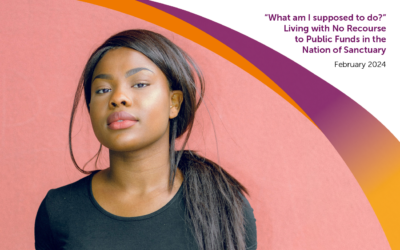 Migration
Migration 
We’ve supported a wide range of groups to respond jointly to the Welsh Government’s consultation on its strategy for ending violence against women, domestic abuse and sexual violence.
The Bevan Foundation is proud to have supported 22 grassroots community activists, advocates, and leaders, and 7 organisations, to jointly respond to the Welsh Government’s consultation on its national strategy for ending violence against women, domestic abuse and sexual violence (VAWDASV).
In December 2021, the Welsh Government published its draft 5-year national strategy for ending VAWDASV. Through our partnership with South Riverside Community Development Centre and Together Creating Communities, which brings the experiences and views of migrant communities to influence policy decisions in Wales, the Strategy was identified by the community members as a key priority for policy influencing.
The consultation process
The views set out in this response were shared during a series of five group discussions held in person and online, facilitated by the Bevan Foundation. Discussions focused on the strengths of the strategy; what is missing from the strategy; and recommendations for improvement.
Key themes
The participants welcomed the emphasis on the importance of prevention and early intervention, and the role of men in challenging other men’s behaviour. There was general support for the creation of a National Partnership Board to streamline work on the key priorities, and there was agreement with the principles and objectives set out in the strategy. Participants felt that the strategy was lacking in detail, particularly in relation to the additional challenges faced by migrant survivors of VAWDASV. Specifically, issues around multiple perpetrators of abuse (e.g. in-laws) and community-facilitated abuse, were not addressed in the Strategy. They felt the strategy was particularly weak in relation to its failure to identify the impact of immigration status and knowledge of rights on migrant survivors’ ability and confidence to seek and get support. They felt that this somewhat undermines the stated commitment to take an ‘equalities approach’, since the issues which directly impact equality were not recognised.
You can see their full response, including the recommendations by downloading the report below.

